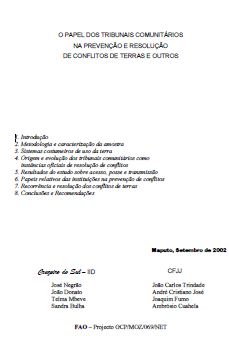Reaching sustainable food security for all by 2020
"As part of its 2020 Vision for Food, Agriculture, and the Environment Initiative, the International Food Policy Research Institute (IFPRI) has articulated a vision of what the world should look like in 2020: it should be a world free from poverty, hunger, malnutrition, and unsustainable natural resource management.
Resource Tenure in Community Based Natural Resource Management project : project evaluation report
Boeren met ruimte voor water, landschap en natuur in Olst-Wezep : een quickscan naar meer mogelijkheden voor boeren om bedrijfsmatig rekening te houden met ruimte voor water(berging), landschap en natuur in het landinrichtingsproject Olst-Wesepe
In het landinrichtingsgebied Olst-Wesepe is de consequentie van het vigerende water- en natuurbeleid dat er een relatief groot oppervlak gronden aan de landbouw moet worden ont-trokken (aankoop) om zaken als ruimte voor waterberging, landschap en natuur te realiseren. De landinrichtingscommissie heeft ALTERRA opdracht gegeven te onderzoeken of er alternatieven zijn voor aankoop: kunnen die doelstellingen ook gerealiseerd worden door aanpassingen in de agrarische bedrijfsvoering voor te stellen, zodat meerboer(en) kunnen blijven, maar ook de beleidsdoelstellingen duurzaam gewaarborgd zijn.
Ruimte voor landbouw; uitwerking van vier ontwikkelingsrichtingen
De landbouw kan worden getypeerd met vier ontwikkelingsrichtingen: grootschalige grondgebonden productie, geconcentreerde agroproductieparken, belevingslandbouw en agrarisch natuur- en landschapsbeheer. De richtingen hebben uiteenlopende perspectieven en ruimtelijke effecten: deze worden beschreven. Tevens zijn kaarten opgenomen met kansrijke locaties
Promoção dos Direitos Relativos à Terra em África: Que diferença fazem as ONGs?
O estudo demonstra claramente as deficiências dos modelos lineares que separam os processos de elaboração de políticas da sua implementação. Ambos os estudos de caso mostram que a legislação e os regulamentos podem ser modificados, reinterpretados ou simplesmente ignorados quando se trata de implementá-los, quando as relações de poder a nível local se tornam críticas. Esta constatação tem duas implicações directas.
The Emergence Of The Landless People’s Movement In SA
The new political dispensation in South Africa was the result of a political compromise, which depended on a crucial agreement to leave many of the existing power and wealth relationships intact. The advent of democracy in South Africa presented African people with long awaited political freedom but minimal social and economic liberation. The wealth was to remain in the hands of the few and any attempts by government to reverse the status quo was thwarted by the realities of the harsh global capitalist market system.
CEDAW Combined Fourth and Fifth Periodic Reports of States Parties: Ethiopia
Ethiopia has combined its fourth and fifth reports to the United Nations Committee that monitors the implementation of the Convention on the Elimination of All Forms of Discrimination Against Women (CEDAW). This report outlines the status of women in Ethiopia and initiatives on the part of all government and non-governmental actors to address the goals set out by CEDAW. Institutional commitments to address gender issues are in place. However, the socioeconomic status of women, particularly in rural areas, remains lower in Ethiopia's male-biased social structures.
Women's Informal Employment in Transition Economies
Women's employment in transition countries, notably Central and Eastern Europe has become increasingly informal and flexible. The first growing trend is that women are more involved in cross-border trade, known as 'suitcase' trade, often keeping women away from home for days or months. They buy mainly consumer and household goods usually unavailable in their home countries, to sell to street vendors on their return home. The second growing trend is women's involvement in sub-contracting, particularly work such as hand sewing for the textile and shoe industries.
O papel dos tribunais comunitários na prevenção e resolução de conflitos de terras e outros
O presente relatório inscreve-se nas actividades desenvolvidas no âmbito do Projecto GCP/MOZ/069/NET, estabelecido entre a Organização das Nações Unidas para a Agricultura e a Alimentação (FAO) e o Governo da República de Moçambique, cujo objectivo geral é o de apoiar a implementação de três diplomas legais recentes e inovadores no ordenamento jurídico moçambicano: a Lei de Terras, a Lei do Ambiente e a Lei das Florestas e Fauna Bravia.
Este objectivo geral desdobra-se em quatro objectivos específicos, assim escalonados:
Papers of FAO/SARPN Workshop on HIV/AIDS and Land, 24-25 June, Pretoria
Series of country papers on HIV/AIDS and land in Lesotho, Kenya, Malawi, South Africa, Tanzania, with concluding paper on methodological and conceptual issues. The key questions addressed include: The impact on and changes in land tenure systems (including patterns of ownership, access, and rights) as a consequence of HIV/AIDS with a focus on vulnerable groups. The ways that HIV/AIDS affected households are coping in terms of land use, management and access, e.g. abandoning land due to fear of losing land, renting out due to inability to utilise land, distress sale of land, etc.









